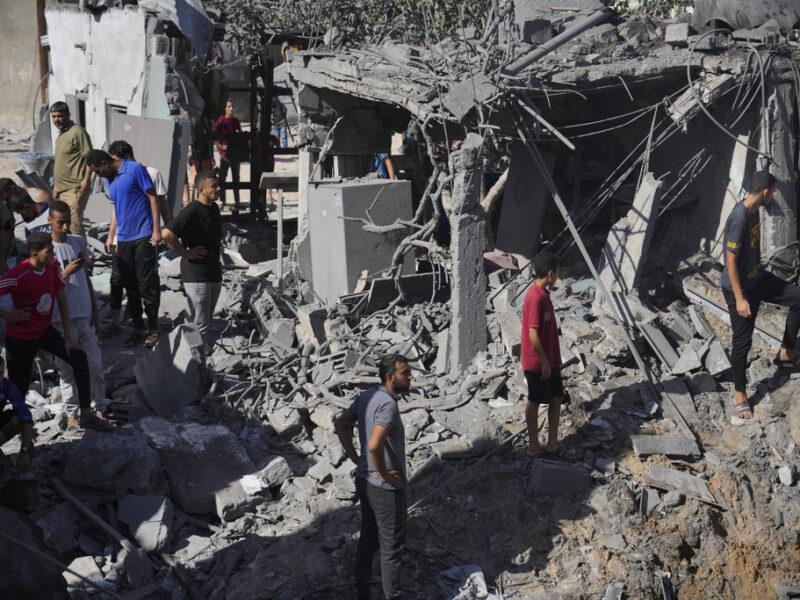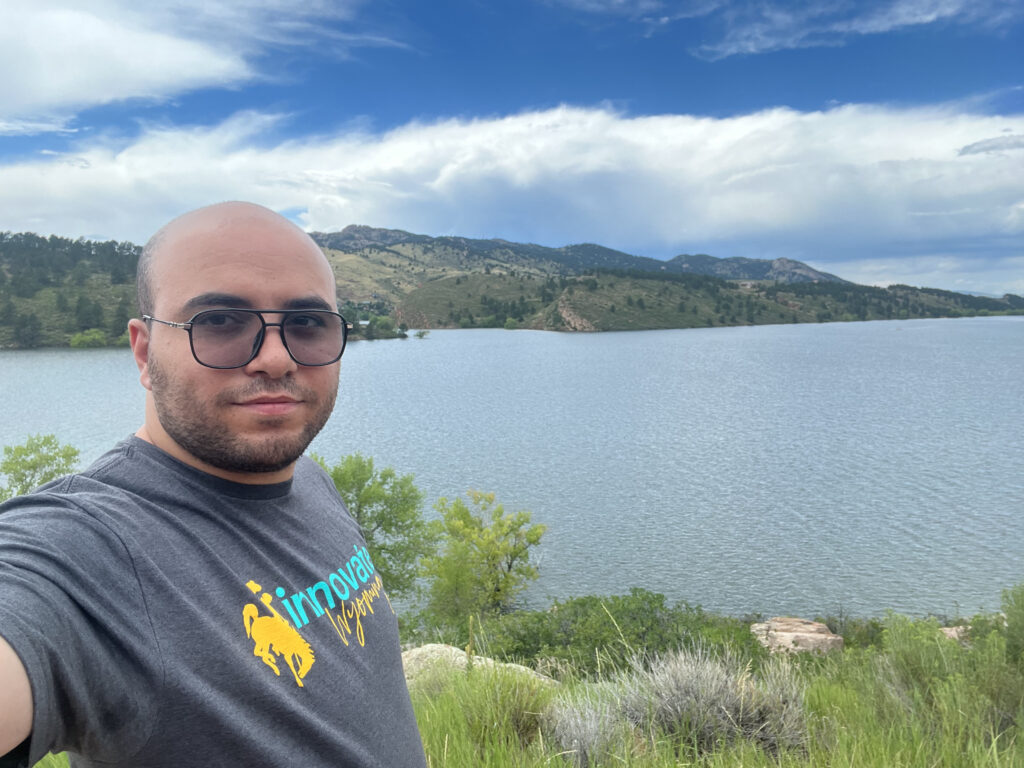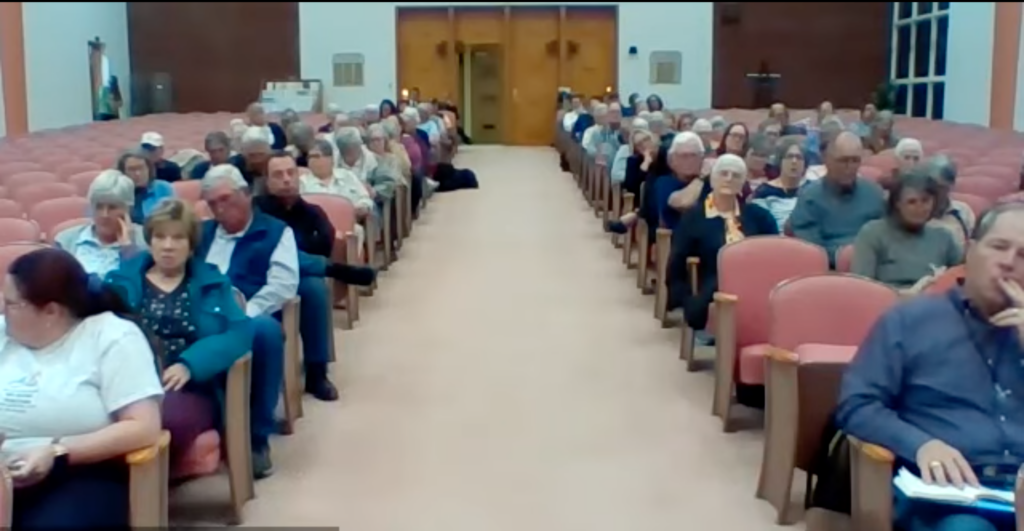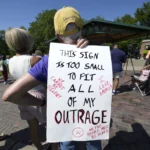Amid Mideast Violence, Wyoming Muslims Worry for Civilians’ Safety — and Their Own
Wyoming’s Islamic community grapples with response to Hamas’ attack on Israel
- Published In: Other News & Features
- Last Updated: Nov 09, 2023

Amid escalating airstrikes from Israel, over 10,000 people have been killed in the Gaza strip, the Gaza Health Ministry said. (AP Photo/Hatem Moussa)
By Jacob Gardenswartz
Special to the Wyoming Truth
When Abdalrahim Abuwarda learned he’d received a Fulbright grant to pursue graduate studies in America, the University of Wyoming (UW) was not one of his top picks.
In fact, it was his fourth — on a list of four options.
But the Laramie community welcomed him with “open hearts,” such that “Wyoming is now my home,” Abuwarda, 30, told the Wyoming Truth. “It became one of my favorite places in the U.S.”
Now, Abuwarda is grappling with what’s happening in his original home — the Gaza Strip — where the Gaza Health Ministry said over 10,000 people have been killed in the violence stemming from Hamas militants’ attack on Israel a month ago.
Members of Abuwarda’s extended family—his cousin and his wife—were among the civilians killed by Israeli military bombings, he said. Abuwarda wakes up each morning fearing his own wife and three children could be next.

“I can’t stand the idea that I might, God forbid, lose one of them,” said Abuwarda, required by Fulbright rules to leave his family behind to pursue his studies. For those still living in Gaza, he added, “It’s hell on [the] ground.”
Abuwarda stressed he did not condone Hamas’ attack on Israel that killed over 1,400 people and said he hoped the over 200 hostages kidnapped by the militants would be freed. He also said he had no problem with Israel’s campaign to eliminate Hamas, considered by U.S. officials to be a terrorist organization.
But he pushed back strongly on some politicians’ insinuations that Palestinian civilians were at all responsible for Hamas’ attack on Israel, and criticized the growing civilian death toll from Israel’s strikes on Gaza.
“We don’t want violence at all,” Abuwarda said. “We are not similar to any radical groups: we love life, we love peace, we want to have a better future.”
The Islamic community in Wyoming is tiny: less than 1% of the population, just over 300 people, according to a Pew Research survey. Even fewer are Arabs or have Palestinian ties.
The state’s political representation reflects this dynamic. Wyoming lawmakers in Washington have backed some of the most pro-Israel policy proposals — measures to divert aid earmarked for Gazan civilians to the Israeli military and bar those with Palestinian passports from entering the U.S.
They may be few in numbers, but Wyoming Muslims are intent not to be forgotten.
“As a minority, you just feel kind of attacked, I guess, and kind of overlooked,” Muhammad Sulthon Nuruddin, a UW senior studying wildlife biology and president of the Muslim Student Association (MSA), told the Wyoming Truth.
Nuruddin, who hails from Indonesia, said he’s noticed a change in how UW students treat people who appear to be Muslim or Arab since the war broke out: mostly “indirect” hostilities like “glances” and “stares.” He said he’s received calls from Muslim families in Laramie “concerned about their safety.”
Like Abuwarda, Nuruddin condemned Hamas’ attack on Israel and spoke of frustration that some Wyomingites may associate all Muslims with terrorists. Indeed, over the past decades, isolated incidents of Islamophobia in Laramie and Gillette garnered national headlines, as some Wyomingites espoused anti-Muslim rhetoric and even threats of violence.
“There’s, I think, 1.4 billion Muslims around the world,” Nuruddin noted. “If we [all] believed in terrorism, then the world would be no more.”

Debates on campus…
For Nuruddin, the trouble started in early October, after UW president Ed Seidel and provost Kevin Carman released a statement about Hamas’ attack on Israel.
“We will not normally or routinely make statements on problems around the nation or world,” the statement read in part. “But this is an instance in which the actions of Hamas were so reprehensible, and the impact on our community so strong, that we feel compelled to do so now.”
Nuruddin said he and other Muslim students felt Seidel’s statement was “very biased”: “He mentioned the Israeli victims and the Hamas terrorists, but he didn’t really mention Palestinians at all.” On behalf of the MSA, Nuruddin wrote to Seidel, arguing his statement endangered Muslim students on campus.
“There are some people out there, uneducated people, who will kind of paint a picture from that statement that all Muslims are bad or all Arabs are bad,” Nuruddin said.
Soon after, Nuruddin, Abuwarda and other UW Muslim and Arab students were invited to dinner at Seidel’s house to discuss the matter. Abuwarda called the meeting a “very fruitful, wonderful, friendly, welcoming event” and said Seidel’s office agreed to help plan an interfaith event with the MSA and leaders of Jewish groups on campus about the history of the Israeli-Palestinian conflict.
Details for the event are still in flux, the students said, and no date has been announced. UW spokesman Chad Baldwintold the Wyoming Truth the dinner meeting was part of the university’s commitment to “the safety and welfare of all UW students,” and a similar meeting with Jewish campus leaders to discuss their safety is in the works.
…and in Congress
Across the country, tensions stemming from the war in the Middle East have come to a head at American colleges: threats against Jews at the University of Pennsylvania and Cornell, as well as crackdowns on pro-Palestinian student organizations at Harvard and Brandeis. No major protests have taken place at UW, students said, and discussions about the conflict have remained respectful.
But debates about how to respond to the Israel-Hamas war are not exclusive to universities.
In Washington, political leaders in both parties responded to Hamas’ Oct. 7 attack on Israel by vehemently supporting Israel.
Yet as Israel’s attacks on Hamas targets in Gaza increased, so, too, did the civilian casualties. In recent days, the White House has publicly backed a so-called “humanitarian pause,” pressing Israeli leaders to halt its bombing campaign to give Palestinian civilians the chance to flee.
But Wyoming officials in Congress have shown little interest in moderation. Last week, Rep. Harriet Hageman (R-Wyo.) voted for a GOP bill to provide over $14 billion in aid to Israel and none to Gaza. She also signed onto a measure which would bar anyone with a passport issued by the Palestinian Authority from entering the U.S., and recently wrote to top Biden administration leaders requesting visa investigations into foreign students who’ve participated in pro-Palestinian protests, suggesting they may be “endorsing or espousing terrorism.”
Sens. John Barrasso (R-Wyo.) and Cynthia Lummis (R-Wyo.) took similar stances. Barrasso signed onto a bill that would redirect any aid for Gaza to the Israeli military, while Lummis called for pulling U.S. funding to the United Nations Relief and Works Agency for Palestine Refugees (UNRWA).
Representatives for Barrasso, Lummis and Hageman did not respond to inquiries about their views on the war and its impact on Palestinian civilians.
In Wyoming, some faith leaders wish their representatives would moderate.
“It’s easy to be anti-Muslim — there are so few Muslims in the state,” said Rev. Rodger McDaniel, a longtime Democratic political official who served for 15 years as the pastor at Highlands Presbyterian Church in Cheyenne. “I think that’s just simply the way to play politics. And it probably plays pretty well in Wyoming.”
Rev. Todd. Scranton, senior pastor at First United Methodist Church and co-president of the Cheyenne Interfaith Council, agreed. The lawmakers are “ideologically driven to the point where nothing will change that,” Scranton suggested, even though it’s his belief that “there will not be any kind of real peace in Israel between the Israelis and the Palestinians until both sides can live with some kind of sense of autonomy and security.”
Abuwarda, meanwhile, wants his family in Gaza to be afforded the same safe life he’s found here.
“They have their hopes, their aspirations, their future plans, and they’re keen for freedom,” he said. “The same way any kid in Wyoming wants to play after he finishes in school, my kids want that as well.”













